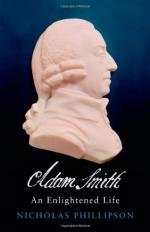|
This section contains 10,330 words (approx. 35 pages at 300 words per page) |

|
SOURCE: "Adam Smith's Empiricism and the Law of Nature. I," in The Journal of Political Economy, Vol. XLVIII, No. 4, August, 1940, pp. 487–520.
In the following excerpt, Bittermann examines Smith's methodology in relation to the doctrine of natural law, arguing that, in formulating his ethical and economic theories, Smith rejected the rationalistic methods of the natural-law school of thought in favor of empirical procedures.
i. the Problem Stated
Adam Smith was both the founder of a science and the prophet of an economic and political creed, and the combination and possible confusion of scientific and normative2 elements in the Wealth of Nations has long provided material for the critics. There were advocates of laisser faire long before Smith, and it may well be contended that economic liberalism was but one aspect of broader philosophic, literary, and political movements of the time directed toward the emancipation of the individual from traditional...
|
This section contains 10,330 words (approx. 35 pages at 300 words per page) |

|


